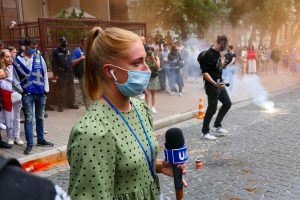27 Jan 2023 | FEATURED: Martin Bright, Index Arts, News and features, Russia, Ukraine, Uzbekistan, Uzbekistan
The title of the play Crimea, 5am refers to the time in the morning the authorities choose to raid the homes of activists in the Russian-occupied territory. It is a time of fear and horror for the Crimean Tatars whose voices make up the text of this verbatim play, taken from the testimonies of the men now held in Putin’s prisons and the families waiting at home for them.
Crimea 5am brings to life one of the lesser-known aspects of the brutal war in Ukraine, which began not in February 2022 but in March 2014. It draws on the oral history of the suppression of the Tatar Muslim minority, who returned to the peninsula in the 1990s following independence after years of exile from their homeland.
Much of what we know of life in Crimea since 2014 has come from activists turned citizen journalists. This is one of the reasons the Russian authorities have cracked down so hard on Tatars, characterizing them either as political extremists or Islamist terrorists linked to the group Hizb-ut-Tahrir.
Two examples from the play show how ordinary Tatars went from being activists, to journalists to dissidents in the face of Russian repression.
Tymur Ibrahimov, 38, moved back to Crimea from Uzbeksitan at the age of six in 1991 after the death of his father. In the play, his wife Diliara, explains his transformation from computer repairman to enemy of the state: “It used to be different, until 2014, you know, back then he would make home videos, he would take pictures of nature, like, of the bees and butterflies on flowers, just like that. It all changed in 2015 and he began making footage of what was going on in Crimea. That is, all the searches, court hearings, “Crimean Solidarity” meetings.” For the crime of recording the resistance of his people Tymur was sentenced to 17 years in prison.
Narminan Memedeminov, 39, also moved back to Crimea from Uzbekistan in 1991. After graduating in economics he became involved in human rights activism and media coordinator for the Crimean Solidarity movement. “Here’s an example: I went and took a video of somebody helping out a prisoner’s family, like, basic stuff, they would take the child to the hospital, help them hang the wallpaper, fix the plumbing, send off the parcels to the detention centre and so on… And in the end, everybody involved was at risk: those who took videos, those who helped, those who did anything at all.”

Index editor at large Martin Bright (left) taking part in a post-play discussion.
The stories have been brought together by two Ukrainian writers, Natalia Vorozhbyt and Anastasiia Kosodii and the project is backed by the Ukrainian Institute and the Ukrainian Ministry of Foreign Affairs as a way of bringing the situation to international attention. I had the privilege of watching a reading of of the play at the Kiln Theatre, Kilburn in London last week with professional actors alongside non-professional activists and supporters. Directed by Josephine Burton and produced by Dash Arts, the play focuses on the domestic lives of the families of the Tatar political prisoners and particularly the women.
Burton told Index that until the 2022 Russian invasion of Ukraine, Crimea has drifted from international attention. “Helped by a media blackout, we forgot that the peninsula has been occupied by Russians for almost nine years now and its Tatar community oppressed,” she said. “Determined to fight this silence, the community has relentlessly documented this oppression – filming and uploading searches, arrests and court cases of its people by the Russian Security Forces. And for this act, these “Citizen Journalists” have been arrested themselves and given insanely long sentences, some for up to 20 years in penal colonies.”
Crimea 5am focuses on the everyday lives of Tatar dissidents, drawn from many hours of recordings with the families of 11 political prisoners. “It builds a beautiful and powerful portrait of a community, ripped apart by this tragedy, but also woven with stories of love and resilience through the prism of the wives left behind. It is this mix of tenderness and humour alongside the unfathomable darkness which enables its impact. We the audience become invested in their lives and feel the impact of their tragedy deeply.”
Dash Arts is looking for further opportunities to perform Crimea 5am: https://www.dasharts.org.uk/
2 Feb 2022 | Europe and Central Asia, News and features, Russia, Ukraine

A journalist covering a demonstration in Kyiv, Ukraine, August 2020. Credit: Oleksandr Polonskyi/Shutterstock
While media crews from around the world are arriving in Ukraine to cover the situation amid a build-up of Russian troops on Ukraine’s border, local journalists are trying to overcome the many obstacles that stand in the way of their media freedom. The working environment is challenging: from disinformation campaigns and orchestrated propaganda to limited resources in newsrooms, attacks on journalists and the often inadequate response of law enforcement.
In Ukraine, the armed conflict has been going on for almost eight years, ever since Russia annexed the Crimean peninsula and put armed forces in eastern Ukraine. In the wake of this, the Ukraine government has trod a difficult path as they have tried to balance media freedom and plurality against the risks that could be posed from an unregulated media landscape. They have not always made the right decisions. For example, one year ago, President Volodymyr Zelensky imposed sanctions that resulted in three TV channels associated with a pro-Russian politician – ZIK, NewsOne and 112 Ukraine – being taken off air. While some Ukrainian media experts supported the move, others saw it as repressive and criticised the authorities because they bypassed legal procedures and did not provide enough information to justify emergency restrictive measures.
At the same time Ukraine does face a real problem when it comes to misinformation. The ecosystem of online platforms and various social media in Ukraine that are being used by both state, influential non-state and political players is extensive. According to a report from Freedom House, paid commentators and trolls have proliferated Ukraine’s online public space. In many cases, these online platforms are anonymous and are spreading and amplifying messages that benefit the Russian government and seek to destabilise the Ukrainian political landscape. Many of these accounts have tens of thousands of subscribers and are being used by interested parties from inside or outside the country. They spread anything from malicious disinformation to banal clickbait to attract news audiences and they also attack journalists. According to the Institute of Mass Information survey, the majority of Ukrainian journalists have experienced some form of cyberbullying.
Independent journalists suffer from the damage related to misinformation, and their day-to-day duties are not easy either. Media workers in Ukraine are often defenseless against attacks and police responses to them can be inadequate. About 100 Ukrainian media workers were physically assaulted in 2021, revealed Ukraine’s National Union of Journalists (NUJU). This is hardly an improvement on the last year, when 101 journalists were physically assaulted.
Despite the tightening of legislation regarding accountability for attacks on journalists, the efficiency of the law enforcement system remains low, so the perpetrators often go unpunished. Several murders of famous journalists have not yet led to the punishment of those responsible. In 2019, Vadim Komarov, a journalist and blogger from Cherkasy, was violently attacked by an unknown person in a city center. Komarov was known for his exposes of corruption. He died in hospital after several months in a coma. Police still haven‘t found the perpetrator and the investigation remains open.
Another frightening example of the violence that Ukrainian journalists encounter in their work is the murder of Pavel Sheremet in 2016. Sheremet, who was a harsh critic of Ukrainian, Belarusian and Russian authorities, died in a car explosion in downtown Kyiv. Three years later, after a new president came to power, the police detained five suspects. The trial is ongoing and as yet no one has been sentenced.
Sometimes difficulties arise from where they were not expected. For example, the NUJU says that rising prices for natural gas and fuel have caused many regional newsrooms to be unable to heat their editorial offices.
It’s hardly a surprise that about 48% of journalists reported self-censoring in the Ukrainian media, according to a 2019 study by the Ilko Kucheriv Democratic Initiatives Foundation. Topics related to patriotism, separatism, terrorism and Russia were the ones most avoided. And almost 65% believe that the war has increased self-censorship. Then there are those who literally get told what to say. For example, former employees of the state TV channel DOM have spoken about censorship by the Office of the President of Ukraine, which has demanded positive news about the president and his initiatives.
Given all of these attacks, how exactly can Ukraine’s journalists hold power to account?
And yet, thanks to the efforts of the journalistic community there is progress, the head of the NUJU Sergiy Tomilenko believes. Representatives of media and journalistic organisations have consistently raised concerns about the safety of journalists publicly and in face-to-face meetings with government officials for years. According to Tomilenko, the police have begun to investigate faster than before, and now see attacks against journalists as what they are – threats to the very nature of their work.
Media freedom and pluralism is crucial in general and no more so now. We need to see more positive change and fast.


